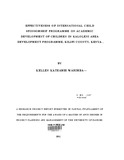| dc.description.abstract | For millions of households in wealthy countries, international child sponsorship programs represent one of the most direct forms of involvement with the poor in the developing world. Sponsorship gives donors the opportunity to bring hope into the life of a child. By sponsoring a child, one can help meet the critical needs of a hurting child. Through sponsorship, one can offer lasting hope and a brighter future for a child living in extreme poverty. Millions of supporters across the world choose to sponsor a child. They make up a very large public constituency for international development.
In general the vast majority of child sponsorship supporters appreciate that child sponsorship funds are used to benefit all children, including their sponsored child. At the same time they value the connection that a link with one other human being on the other side of the world brings. The key purpose of the study was to establish the effectiveness of international child sponsorship on the academic development of children. The study sought to determine some of the factors influencing the effectiveness. The objectives of the study were achieved at the end of the study. A descriptive research design was undertaken with a sample of 90 subjects. A statistical package, stata, was used to do analysis while Microsoft excel was used for data entry and descriptive analysis.
The results established that donor funding, child selection criteria and sponsor-child relationship through frequent communication and visits were key factors that influenced effectiveness of international child sponsorship on academic development of children. While donor funding and sponsor-child relationship had a direct influence on the academic development of children; child selection criteria was found to be a key factor in influencing people's attitudes and ensuring community co-operation in undertaking various interventions from sponsorship funds.
It was recommended that sponsorship funds from donors should be used for interventions that address root causes of problems in the community and not addressing the symptoms. Accountability of the funds is also critical. It is also important that donor funds should be predictable and reliable in terms of flow, disbursed timely and based on demonstrated need and performance as opposed to basing funding on the number of sponsored children as determined by the supporting/funding agency. It is important to clearly define to the community how child sponsorship actually works and the roles of community members when an organization first comes into a community so as not to create false expectations.
Communication between the sponsors and their sponsored children should be encouraged as it gives sponsors the unique opportunity to witness the life changing effect of their donations achieved through personalized correspondence with their sponsored child. This further ensures retention of the sponsors into the programme. Visiting the sponsored child gives that ultimate opportunity for both child and sponsor transformation. | en_US |

